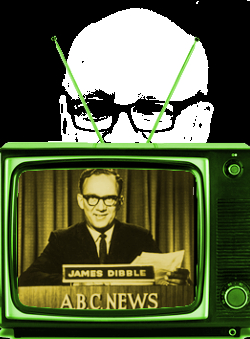Public news cut while privates cut new path
 Dozens of ABC journalists will be sacked, and their union says it is just the start of big cuts to the national broadcaster.
Dozens of ABC journalists will be sacked, and their union says it is just the start of big cuts to the national broadcaster.
Despite being consistently ranked as Australia’s most trusted news services, the ABC and SBS have suffered in recent months.
ABC chief executive Mark Scott this week said the Federal Government will stop backing ABC International, which had been allocated around $200 million per year to run the Australia Network and the Asia Pacific News Centre.
He said news bosses are looking at a raft of changes to the service operating with millions less in funding.
The ABC’s international services have the largest penetration of any global network in some parts of Asia, but will be ‘converged’.
The Community and Public Sector Union says this means up to 80 jobs will be axed.
The broadcaster’s coffers are being raided, with $43 million cut in the latest budget and an efficiency review recommending a further $40 to $50 million be reclaimed by the Federal Government.
In his maiden speech to Parliament new Senator James McGrath - a former Liberal party strategist - condemned the "leftist" lean of the ABC and called for youth radio station triple j be privatised immediately.
“I want to support the ABC. I like the ABC,” Senator McGrath told Parliament.
“Yet while it continues to represent only inner-city leftist views, and funded by our taxes, it is in danger of losing its social licence to operate.”
“As someone who grew up in regional Queensland, I grew up with the ABC but the ABC has left people like me and my constituents behind.”
The ABC maintains Australia's largest and most comprehensive rural news service, at a standard that profit-base private news agencies would have almost no inclination to uphold.
The latest cuts come a fortnight after the announcement of the new members on the boards of the ABC and SBS.
The appointments have been criticised as a move to “stack” the board with executives sympathetic to the LNP, many members of which are outspokenly opposed to much of the ABC’s news content.
Conservative commentator Janet Albrechtsen and former deputy Liberal Party leader Neil Brown have been posted on the nomination panel to decided a short list of candidates for new ABC and SBS board positions.
Dr Albrechtsen has previously called the ABC a “Soviet-style workers collective”, and claimed that ABC managing director Mark Scott should resign after the network reported on Edward Snowden’s leaks about Australia spying on Indonesia.
Mr Brown says the ABC should be fully privatised; a move he believes would end what he calls an “endemic lack of objectivity and balance”.
Having decisions made by figures so clearly opposed the operating style of the public broadcasters is “extremely disturbing”, according to community support group Friends of the ABC.
“This has totally undermined the integrity of the ABC board appointment process,” the Friends’ spokesperson Glenys Stradijot said.
Meanwhile - as if to show exactly why a public independent broadcaster must be maintained - the world’s most prominent media boss has moved to expand his news empire.
Rupert Murdoch has had an $US80 billion bid for US media giant Time Warner rejected.
Murdoch’s company 21st Century Fox made the move to expand its sphere of influence by buying most of its competition in US markets.
Time Warner owns the Warner Bros. movie studio and cable channels such as HBO and news network CNN.
The company’s stock jumped 17.3 per cent on news that Mr Murdoch was looking to buy. The jump has now led to speculation that Murdoch will come back with a bigger offer.
It is believed that Fox would agree to sell CNN if it wanted to buy Time Warner, due to regulatory hurdles around owning too much of the country’s news.







 Print
Print